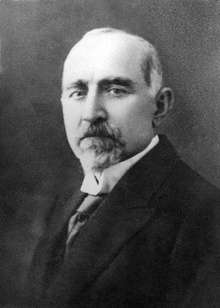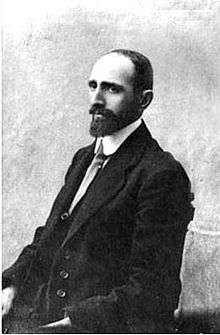Government of the Democratic Republic of Georgia in Exile

After the Soviet Russian Red Army invaded Georgia and the Bolsheviks took over the country early in 1921, the Parliament of the Democratic Republic of Georgia (DRG) decided the Government went to exile and continued to function as the National Government of Georgia, NGG.
History
Exile to France

After the war with the Soviets was irreversibly lost, the Constituent Assembly of Georgia, chaired by Karlo Chkheidze,[1] voted at the last session held in Batumi, on 18 March 1921, the exile of Georgian Social Democratic (Menshevik) Party government chaired by Noe Zhordania.[2] On the same day, the members of the government, several deputies of the Constituent Assembly of Georgia, a few military officers and their families went aboard the ship Ernest Renan and sailed first to Istanbul, Turkey, and then to France whose government granted the Georgian émigrés political asylum.
1924 Uprising preparation
Using Georgian state funds, the government bought a 5-ha domain surrounding a small "castle" (actually, a hunting lodge) in Leuville-sur-Orge, a small town located near Paris. Leuville was declared an official residence of the government in exile. Although the émigrés experienced a permanent shortage of money, Zhordania's government maintained close contacts with the still popular Georgian Social Democratic (Menshevik) Party and other anti-Soviet organizations in Georgia, and thus presented a certain nuisance value for the Soviet authorities. The NGG encouraged and helped the Committee for Independence of Georgia, an inter-party bloc in Georgia, in its struggle against the Bolshevik regime, which culminated in the 1924 August Uprising. Prior to the revolt, Noe Khomeriki,[3] the Minister of Agriculture in exile, Benia Chkhikvishvili,[4] the former mayor of Tbilisi, and Valiko Jugheli,[5] the former commander of the People’s Guard, secretly returned to Georgia, but were arrested and shortly executed by the Soviet secret police, Cheka.
International attention to Georgia
The NGG attempted on numerous occasions to bring Georgian affairs to international attention. Several memoranda urging for the support of the Georgian independence cause were sent to the British, French, and Italian governments as well as the League of Nations which adopted two resolutions, in 1922 and 1924, in support of Georgia's sovereignty. Generally though, the world largely neglected the violent Soviet takeover of Georgia. On 27 March 1921, the exiled Georgian leadership issued an appeal from their temporary offices in Istanbul to "all socialist parties and workers' organizations" of the world, protesting against the invasion of Georgia. The appeal went unheeded, though. Beyond passionate editorials in some Western newspapers and calls for action from such Georgian sympathizers as Sir Oliver Wardrop, the international response to the events in Georgia was silence.[6]

Death of Karlo Chkheidze and Noe Ramishvili
The hopes of the Georgian émigrés that the Great Powers intended to help had begun to vanish.
A heavy loss was sustained by the Georgian émigrés when Karlo Chkheidze, committed suicide[7] in 1926 and Noe Ramishvili,[8] the most energetic Georgian émigré politician and president of the first government of Democratic Republic of Georgia, was assassinated by a Bolshevik spy in 1930.
Soviet penetration of Georgian emigration
The Soviet intelligence managed to heavily penetrate into the exiled government structures due largely to Lavrentiy Beria's personal intelligence network, both before and after the Second World War.
Politics
Diplomatic recognition
With the emigration of Zhordania's government and the establishment of the Georgian SSR, the question of recognition arose for the foreign states that had de jure recognized the independence of Georgia before the Soviet takeover. Some countries, particularly Liberia and Mexico, recognized the DRG when its government was already in exile, on 28 March 1921 and 12 May 1921, respectively. The NGG continued to be recognized for some time as "the legitimate Government of Georgia" by Belgium, the United Kingdom, France and Poland.[9] The NGG was able to maintain a legation in Paris until 1933 (chaired by Sosipatre Asatiani[10] when it was closed as a result of the Franco-Soviet Non-Aggression Pact of 29 November 1932. The NGG and its chief ally in Europe, the International Committee for Georgia, the president of which was Jean Martin, director of Journal de Genève, later launched a campaign against the admission of the Soviet Union into the League of Nations, which nevertheless took place in September 1934. Thereafter, the NGG effectively became defunct.[11]

Heads of the National Government of Georgia in exile
- 1921–1953 — Noe Zhordania (1868–1953)
- 1953–1954 — Evgeni Gegechkori (1881–1954)
See also
References
- ↑ (French) Nicolas Tchkhéidzé, Président of l'Assemblée constituante.
- ↑ (French) Noé Jordania, Président des second et troisième gouvernements.
- ↑ (French) Noe Khomeriki, ancien ministre de l'Agriculture.
- ↑ (French) Benia Chkhikvishvili, ancien maire de Tbilissi.
- ↑ (French) Valiko Jugheli, ancien commandant de la Garde populaire.
- ↑ King, Charles (2008), The Ghost of Freedom: A History of the Caucasus, p. 173. Oxford University Press, ISBN 0-19-517775-4.
- ↑ Georgian government in exile, Karlo Chkheidze's burial.
- ↑ (French) Noe Ramishvili, President of the first Government.
- ↑ Stefan Talmon (1998), Recognition of Governments in International Law, p. 289-290. Oxford University Press, ISBN 0-19-826573-5.
- ↑ (French) Sosipatre Asatiani, premier secrétaire de la Légation géorgienne à Paris.
- ↑ David Marshall Lang (1962). A Modern History of Georgia, p. 258. London: Weidenfeld and Nicolson.